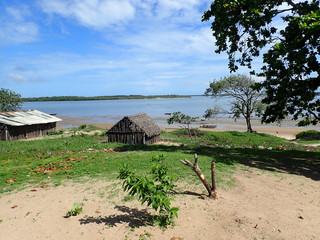“If there were no shrimps, I wouldn’t be here anymore”, is a statement frequently made in Barrinha and shows the importance of shrimps for this place. Barrinha is a village situated on the Carrapato island in the municipality of Água Doce in Maranhão, northeastern Brazil. It is the only remaining village of the island thus the name Barrinha refers today to the whole island. In Barrinha, shrimp fishing is the main source of income. The village is made up of no more than 20 houses and several fishermen huts, simple wooden shelters temporarily occupied by fishermen from various villages situated on the main land.
Tidal flows are an important part of the daily life in Barrinha. On my first visit to the village, I experienced directly the difficulties to reach Barrinha in dissonance with the tidal rhythms, I wrote in my fieldnotes: ‘We arrive in Barrinha by low tide. Even our experienced boat driver didn’t calculate this detail. Unlike other villages in the delta, Barrinha does not have a fluvial port that varies with the tidal fluctuation. So, arriving there, we all look with surprise at the huge field of mud extending in front of us. We have two choices now: either we wait for the high tide to bring us closer to the village or we leave the boat where we are and try to make our way through the muddy field. Hungry and curious to see the new place and its people, we decide for the latter. I struggle to walk through the mud, it’s pushing me down, my legs are in mud up to the knees. There’s nothing to hold on, the ground is unstable, so I lose control over my balance. I place slowly one foot in front of the other, concentrating to not slip and fall down in the mud. Finally, we make it through the mud and at the sandy shore, some fishermen are already waiting for us with a bin full of water. We do not seem to be the first visitors that arrived at the “wrong” moment in Barrinha’.
It’s a certain kind of tide also that brings the shrimp. When the tidal water starts to turn dirty, then it’s good for fishing shrimps. Only the bigger tides occurring at new or full moon turn the water dirty, as they largely flood the mangroves and bring back a muddy brown kind of water to the river and canals. This moon tides also bring a flow of fishermen to Barrinha, younger and older men from various places on the terra firme (stable land) come for shrimp fishing twice a month. They stay for seven or eight days each time and then return to their homes and families. The fishing is done by night in teams of four fishermen. They fish with a net called ‘redinha’, which in English means ‘small net’.
Especially during these days of shrimp fishing, the life in Barrinha adjusts to the rhythm of the tide. The fishing is only possible by low tide. They have to drag the net through the water over the muddy ground where the shrimp stays thus when the water is too high, the men do not have enough ‘hold’ to push the net through the water. Accordingly, the fishermen have to leave with ebb tide. In the beginning, during the first days of fishing, it’s good for the fishermen because they leave early around 8pm and they come back not too late. However, with everyday that passes, the tidal rhythm delays about 50 min. and the fishermen leave later. Towards the end of the fishing period, they will leave only around 10 or 11pm and come back at 4 or 5am. These days are the hardest ones as the men are already tired of the previous days of fishing and now they have to stay awake until 11pm to leave. For the ‘catadores’ (‘pickers’) it’s the contrary. They start to work when the fishermen come back, they immediately start to sort the shrimp, separating smaller from bigger ones, and red shrimp from white shrimp. The ‘pickers’ are mainly women from the village and some of the man that do not fish. For them work gets better towards the end because in the beginning they have to get up in the middle of the night, work for approx. 2 hours then go back to sleep while as in the end they start their work only in the early morning around 5am.
The attempt to adjust to the rhythm of the shrimp tide, however, is not as harmonious. Fishermen struggle quite a bit to align themselves and to withstand the whole 8 days of fishing. One of the difficulties is, that the rhythm of the tides and so the rhythm of work of the fishermen, gets in friction with other rhythms. Indeed, it does not align with the day/night rhythm and the rhythm of the ‘clock time’. In the village everyday life however ‘clock time’ as well as the day/night rhythm continue to be important. Lunch is still served at noon, football is played in the afternoon when the sun isn’t that hot anymore, the ones attending school (a project of alphabetization for adults) have class at 2pm, the generator and thus television starts working at 6pm. It’s with these activities and their rhythms that the fishermen’s work rhythm gets in friction. It’s frequent thus, that the men decide to stop fishing after 3 to 4 days, when it’s getting more difficult because they’re tired of the previous days of fishing and they have to leave late. Besides, there’s the danger to get in temptation of drinking ‘cachaça’ (sugarcane liquor) with some of the men that do not leave for fishing. The ‘master’, mostly an older fisherman who’s guiding the team, who’s responsible for them and takes major decisions, thus has the challenge to motivate his team during the whole period of fishing. When the night starts falling, he’ll start checking regularly on every member of his team to make sure they’re all in good condition and he doesn’t lose one to drinking. He knows that if only one member misses, the whole team will have to abandon fishing for that night which would create miss mood in his team and could spoil the whole following days of fishing.

